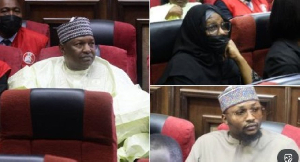Given the widespread reports of attacks on police stations across in the media, in recent weeks, we can say that Nigeria has treated its police as well as other law enforcement men and women unfairly. Why the recent police deaths are particularly problematic is because of the dramatic rate, unique nature, strangeness, and unfortunate messages these acts send to the country.
All these are happening suddenly as Nigeria looks like tumbling into the darkness due to its most crucial issues such as lawlessness, impunity, nepotism, joblessness, hopelessness, corruption, insecurity, and kidnapping.
It was just on October 20, 2020, to be exact, that peaceful and unarmed protesters took part in anti-police brutality demonstrations across the country. Nigerians and the world at large were stunned after police personnel and soldiers opened fire on the unarmed protesters against police brutality.
The President, Major General Muhammadu Buhari (retd.), two days later, in one of his rare, televised addresses to the nation, hardly made any reference to the youths killed and severely injured in the country’s most powerful protest against police brutality ever.
I see that as a grave emotional blunder on the part of the President’s advisers especially as it sends the message that Nigeria does not care about its people’s human rights.
And six months later, at a time when the nation is dangerously being driven by mass insecurity, our police officers and other law enforcement agents are now constant targets for violence. Guess what, unlike most nations, these law enforcement deaths did not spark any sort of national outcry. Unusually, police officers have mostly been shot, ambushed, and slain by unidentified gunmen in unusual occurrences worldwide.
Oddly, while death of police globally is primarily being linked to traffic stops and responses to domestic violence calls, in Nigeria, police officers are being attacked and slaughtered in different police stations and at stationary security checkpoints.
At the same time, attackers burn police stations, set patrol cars on fire, take away police assault rifles, film, and mock dying police officers, behead and burn police bodies and even free persons held in custody with many of them held beyond allowed time.
In America, official reports so far this year, show that roughly 45 or so police officers have been shot with 11 killed. Let us compare. At the time of this writing, and in the last 100 hours, media reports and police statements show that no fewer than 18 police officers have lost their lives and more than 40 policemen have been killed in the last two weeks across Nigeria. It could far be more given our poor data reporting in terms of actual police deaths and severe injuries.
The world and Nigerians are not specifically wondering what could be contributing to an anti-police atmosphere that puts officers in daily danger because for far too long the Nigeria Police especially has engaged in brutal suppression of its citizens — mostly in the hands of the reportedly gone notorious Special Anti-Robbery Squad, known as SARS. The now disbanded SARS had been accused of extortion, rape, kidnapping, harassment, torture, and extrajudicial killings.
Police officers have been known to target physical features of citizens such as dreadlocked or brightly coloured hair, holding iPhone as well those with laptops and tattoos. Police officers are known to shoot live ammunition to disperse protesting crowds, in parties, and in some cases, kill or permanently injure innocent Nigerians. What is all that about?
Very often, due to ineffective government and poor police accountability institutions and mechanisms, justice is hardly done in many cases, and the end to the violence from both sides continues.
Our police officers cannot all be bad. Many police operatives, unfortunately, will remain easy target for slaying by surprise and ambushed as they find themselves in stations, checkpoints and surroundings that lack appropriate and adequate communication gadgets, adequate electrical power supply lines, operational patrol vehicles/boats, and adequate weapons and firearms. Many lack special personal protective equipment such as body armour coverage like tactical gear and ballistic shields. So, they become targets for killings.
One thing is obvious, however. No matter what anyone thinks about law enforcement institutions in Nigeria, the law enforcement officers who get killed in the line of duty all have families. When they die, their families will be notified. It must be done with sensitivity and compassionately especially given the horrible and violent way many are dying. There should b no phone call to family members, and the notification officer(s) visiting the homes should be accompanied by a cleric, psychologist, physician, or close friend. There must be an active system of disability benefits for police officers severely injured, and death benefits for those killed in the line of duty that will be immediately available to surviving families.
If Nigeria is to work towards becoming a healthy democratic society, police adherence to human rights must improve, the same as police–community relations. Also, law enforcement technology, electricity and water, information and communication must improve as well as police efficiency. As I continue to argue, this will not come through a centralised Nigeria Police Force but with the creation of state policing.
Opinions of Thursday, 13 May 2021
Columnist: Prof. John Egbeazien Oshodi
Worrisome violence against police officers
Entertainment














